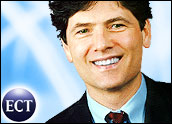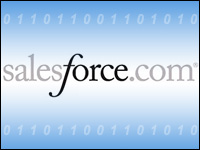
In its short life, Salesforce.com has garnered more than its fair share of publicity, thanks in no small measure to the activities of its founder, CEO and chairman, Marc Benioff. Benioff may be the 21st century high technology answer to P.T. Barnum, a colorful figure in an industry that has more shades-of-grey personalities than McDonald’s has ways of stacking burgers, buns and lettuce.
Who can forget Benioff’s marketing genius, starting with innovations like the “no software” logo modeled on that of the movie “Ghost Busters”? Who can forget the direct challenge to Siebel Systems and the rest of the conventional software establishment with ads featuring a nine-year-old writing at the blackboard a hundred times, “I will not let Siebel take my lunch money.” At the time, taking on the market leader was a breathtaking David-and-Goliath clash.
Each challenge was backed up with product and rode a wave of discontent that fueled belief in the core message. Now, Siebel is part of Oracle, along with PeopleSoft, and the establishment is regrouping. Salesforce.com is now challenging Microsoft, Oracle and even IBM with its AppExchange, which promises to radically alter the way people make enterprise software just ason-demand computing has altered the way people use and pay for it.
Drafting Behind the Leader
For years, the rest of the on-demand market has been drafting behind Salesforce.com and Benioff’s marketing brilliance, and Salesforce.com is now seen in some quarters as less David and more Goliath. The drafting is even taking a nasty turn. For several months, Salesnet, an on-demand sales force automation (SFA) company located in Boston, has been running a marketing campaign that takes a page out of the Benioff play book. Using the same international symbol of a red circle with a slash through it to indicate “No,” Salesnet started the “No Bull” campaign to position itself as the alternative to Salesforce.com.
Prior to the campaign, Salesnet had been in the doldrums along with anyone else who tried to gain market share against the Salesforce.com marketing machine, but the company now says it has traction. We don’t have to take Salesnet’s word for it, though, because it appears that Salesforce.com is getting aroused by the negative publicity that “No Bull” is causing.
A few weeks ago, Salesnet CEO Jonathan Tang tells me, the company received a phone call from Salesforce.com’s legal eagles informing them that the campaign was inaccurate and asking that they stop it. The campaign was based on separate data published in 2005 by Nucleus Research and Deutsche Bank, neither of which sang all the praises of Salesforce.com.
In the best tradition of American business, Tang consulted his attorneys who basically told him he was simply publicizing published material from third parties and that if it were inaccurate, those parties were the true objects of Salesforce.com’s protestations.
Lawyer Up
There are two things in life that I will never quite understand. I am cool with nuclear physics and pride myself that I can name all six quarks, I can converse about the particle and wave duality of light, and I can hold my own in literature — but I will always be stymied by the maneuverings of attorneys and people engaged in high finance.
The parties have now entered what I call a “light” litigation phase in which they have filed declarations and motions in separate suits in their local jurisdictions designed to draw first blood and to cause opposing counsel to schlep across the continent to argue about the merits of “No Bull.” To the best of my understanding, no one has been formally served yet, hence the “light” designation. I wonder if the Salesforce.com matter is about the facts of “No Bull” or simply a case alleging plagiarism.
I suppose there was no possibility of ignoring the challenge for Salesforce.com. The company is intimately aware of what happened to Siebel when that company decided to treat its challenger with contempt by ignoring it. Still, according a challenger the status and respect implied by a lawsuit carries its own risks.
Most competitors in the on-demand SFA space take Salesforce.com to task in one way or another, usually over pricing or features — two useless undertakings. Salesforce.com has about half the market share of the on-demand market. What will happen when the minions dividing up the other half of the pie discover that the way to fame and possible riches — or at least free publicity — lies in getting the big guy to mix it up with them?
We looked on in wonder as Salesforce.com attacked and Siebel did not respond. Siebel was ultimately the victim of a poor economy and impatient investors. The Salesforce.com ads couldn’t have been a lot of fun to look at — but, in perspective, they were only tangential to Siebel’s stagnation. I think Tom Siebel must have known that and factored it into his strategy to ignore the upstart.
Perhaps now we’ll see what a more activist approach produces. Marketing messages are one thing and having product is another. I understand all that, but I still don’t understand lawyers and MBAs.
Denis Pombriant is a well known thought leader in CRM and the founder and managing principal of the Beagle Research Group, a CRM market research firm and consultancy. Pombriant’s latest white paper, Adding Sales to the Call Center Agenda, summarizes his recent research in the call center industry. In 2003, CRM Magazine named Pombriant one of the most influential executives in the CRM industry. Pombriant is currently working on a book to be published next year. He can be reached at [email protected]
























































